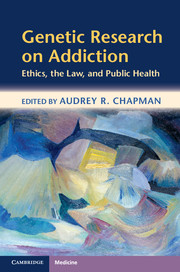Book contents
- Frontmatter
- Contents
- Contributors
- Preface
- Section 1 Introduction
- Section 2 Research ethics
- 4 Improving the informed consent process in research with substance-abusing participants
- 5 Ethical considerations in genetic research with children affected by parental substance abuse
- 6 Protecting privacy in genetic research on alcohol dependence and other addictions
- 7 Certificates of Confidentiality: Uses and limitations as protection for genetic research on addiction
- 8 Ethical issues in human genomic databases in addiction research
- 9 Should addiction researchers accept funding derived from the profits of addictive consumptions?
- 10 Ethical issues related to receiving research funding from the alcohol industry and other commercial interests
- Section 3 Translating addiction research
- Section 4 Conclusions
- Index
- References
9 - Should addiction researchers accept funding derived from the profits of addictive consumptions?
from Section 2 - Research ethics
Published online by Cambridge University Press: 05 September 2012
- Frontmatter
- Contents
- Contributors
- Preface
- Section 1 Introduction
- Section 2 Research ethics
- 4 Improving the informed consent process in research with substance-abusing participants
- 5 Ethical considerations in genetic research with children affected by parental substance abuse
- 6 Protecting privacy in genetic research on alcohol dependence and other addictions
- 7 Certificates of Confidentiality: Uses and limitations as protection for genetic research on addiction
- 8 Ethical issues in human genomic databases in addiction research
- 9 Should addiction researchers accept funding derived from the profits of addictive consumptions?
- 10 Ethical issues related to receiving research funding from the alcohol industry and other commercial interests
- Section 3 Translating addiction research
- Section 4 Conclusions
- Index
- References
Summary
It is surprising just how easy it is for one’s mind to find justifications for what one wants to do. Similar to the way a knee reflex responds to a strike from a doctor’s rubber mallet, justifications seem to emerge smoothly and automatically; they swing into action to counter even the slightest prod of conscience: I eat meat because where else will I get sufficient protein; I drive a car to work because the city’s public transport system is so lousy; I avoid giving to that charity because that organization is corrupt.
But, of course, one’s mind does not pull these justifications out of thin air.
This was brought home to me some time back while in the throes of preparing a grant application on behalf of our department. Our university had established a new fund for staff to invite international experts into departments to promote teaching and research endeavors. It was a generous allowance with enough money to host an overseas visitor for 1 to 3 months. Since such opportunities were rare, we quickly arranged a meeting of interested staff and began brainstorming a proposal. We settled on the idea of inviting a leading academic in community development from overseas who could help boost our fledgling development projects. That person could present in seminars, guide our current projects, input into student research, and help us devise and compile a funding application for a large new project. We were excited. The visit would raise our efforts to a new level.
- Type
- Chapter
- Information
- Genetic Research on AddictionEthics, the Law, and Public Health, pp. 122 - 138Publisher: Cambridge University PressPrint publication year: 2012
References
- 3
- Cited by

